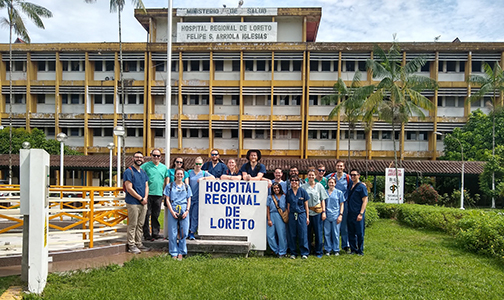
When he decided to participate in a four-week international health elective that took him to the Amazon rainforest in northern Peru, M4 Joe Walbridge hoped the experience would help him gain a more global perspective of medicine and a greater level of empathy for the patients he will soon serve as a first-year resident.
His time in Peru provided him all of those things, Walbridge said recently. The experience, he said, was life-changing.
READ MORE: A service trip to Peru offers lessons for treating Covid-19 in the U.S.
“To be able to be a part of that environment and be able to observe a people and a culture on such an intimate level, I’ll never forget it,” said Walbridge, who is set to begin his residency training in internal medicine this summer at Gunderson Health System in Wisconsin. “Having that kind of autonomy as a medical student and be able to participate on that deep of a level in each patient’s care was unmatched to any rotation I’ve had so far. It was the best rotation that I’ve done for my medical career to this point.”
Walbridge was part of a team of 20 people, which included students, resident physicians, and faculty from WMed, who visited Peru for two and a half weeks during February and into early March. The rotation, now in its fifth year, is for WMed residents and fourth-year students, and led by Dr. Tom Melgar, a professor in the medical school’s departments of Medicine and Pediatric and Adolescent Medicine.
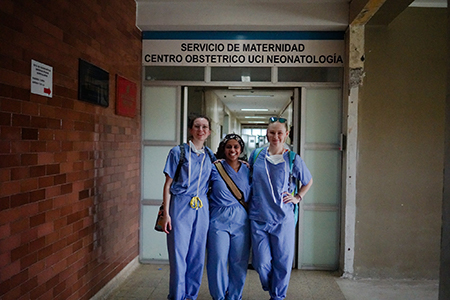
The elective rotation in Peru is part of Dr. Melgar’s work with Amazon Promise, a U.S.-based non-profit organization that provides medical and dental care in remote areas of the Upper Amazon Basin.
The application deadline for next year’s trip to Peru is Thursday, April 30, 2020. WMed residents and fourth-year students who want to attend can apply on the WMed website.
Dr. Melgar said the time that residents and students spend in the Amazon provides them with opportunities to practice medicine and hone their skills in a resource-limited environment. The physicians-in-training and future physicians have little technology at their disposal, which requires them to focus on conducting thorough physical exams and patient histories.
“It is a challenging environment,” he said. “Our residents and students have to learn quickly how to be creative and adapt, and make diagnoses without the latest equipment.”
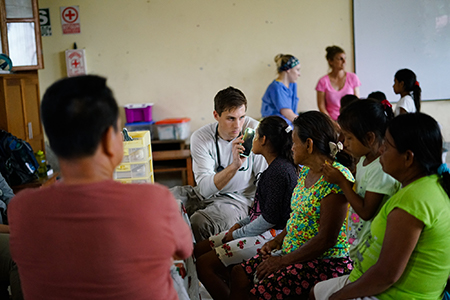
The team from WMed, which was accompanied by students and faculty from Penn State University, traveled to the Amazon with two ultrasound machines, more than 1,000 pounds of medications, and about 1,400 prescription eyeglasses, sunglasses and reading glasses supplied by different organizations, including WMed Insight, a charity started by a former and current WMed resident. Their days began at about 7:30 a.m. when the group would split into three teams and then travel by boat to villages along the Marañon River where they would set up clinics in school buildings. On a typical day, the team served between 100 to 350 patients, Dr. Melgar said.
During their time in the Amazon, Dr. Melgar said students and residents treated Peruvians in 21 different villages, many of which had either contaminated water or no water source other than the river. Students and residents worked together in teams with translators and treated many patients for intestinal parasites. There was also a Dengue fever outbreak in Peru while the team was there, Dr. Melgar said.
“I would say the majority of what we are doing is eliminating worms from patients and it seems kind of mundane but it has the largest medical impact on the patients,” Dr. Melgar said. “Kids grow taller, they do better in school, and patients are much healthier overall.”
Dr. Melgar said the group from WMed is the largest that has taken part in the international elective in Peru. In previous years, the team had been made up of as many as 12 people. This year’s trip also provided the opportunity – for the first time – to serve villagers along the Marañon River, which ends at the confluence with the Ucayali River to become the Amazon River. During previous trips to the Amazon, Dr. Melgar said his team had visited villages along the Ucayali River.
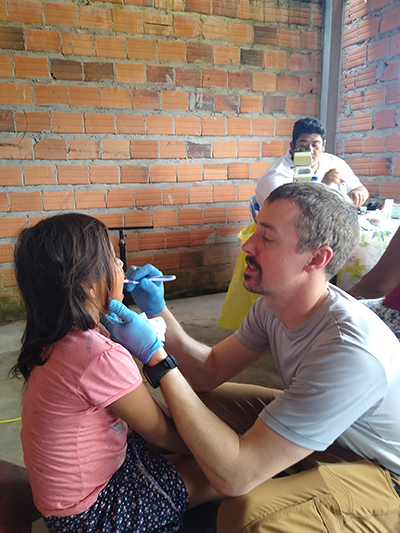
Dr. Kim Baran, a second-year Pediatrics resident at WMed, said she enjoyed the chance to help and bond with the children who visited the clinics each day in the Amazon. She said the team was able to provide families with medications they otherwise would not have been able to obtain to provide significant relief for otherwise simple medical problems such as scabies or skin rashes.
"I was shocked to see how these populations lived and thrived, but I was also inspired by how they led such happy and relatively healthy lives with so much less than the typical American,” Dr. Baran said. “My main inspiration I gained from the trip is that it reaffirmed that global health is something I want to continue being part of in my future and I could certainly see myself doing so in Peru, as there is such a high demand and a great appreciation from the patients.”
Like Dr. Baran, Walbridge said he too was heartened by the resilience of the Peruvian people. In addition to their work in the daily clinics, Walbridge said he got the chance to go on a few house calls and interact with patients “on the most intimate level.”
In one instance, Walbridge recalled how he was part of a team that was taken to a home in the Amazon by a 70-year-old woman whose 96-year-old mother was in need of medical care. The younger woman took Walbridge and other members of the team to her home, pushing them on a boat through nearly waist-high water.
Once they arrived at the home, Walbridge said he and the doctors on the team evaluated the 96-year-old woman, who was immobile and experiencing intense pain from a hip fracture she had suffered in a fall. Walbridge said the woman was failing to thrive and slowly dying from the hip fracture. The team provided the family with a palliative care package of medicines, he said.
As the interaction concluded, Walbridge said the family – despite the news doctors had given them about the 96-year-old woman – was filled with gratitude and asked to have their photo taken with the team.
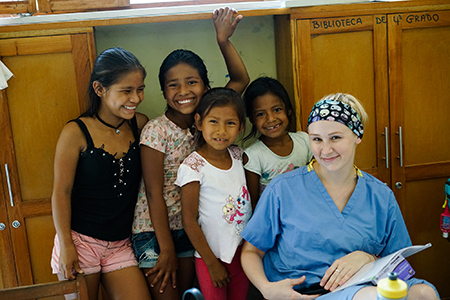
“There were a lot of tears shed by everyone in the family but their gratitude through those tears was just a reminder of their resilience,” Walbridge said. “It was such an eye-opening experience with so many different aspects of medicine that we got to practice on the deepest, most serious, most real level with the background of the power of the Amazon jungle the harsh conditions they live in, and the gratitude they still have every day.”
Walbridge’s classmate, M4 Lakshmi Ramachandran, said the time she spent in the Amazon during the international health elective provided “a huge learning experience” and an opportunity for her and other medical students on the trip to learn how to be creative with the resources they have on hand.
“It’s just learning how to go with the flow, there’s a lot that is unpredictable on a global health trip and you don’t know which patients are going to come into your clinic,” said Ramachandran, who will begin her residency training in obstetrics and gynecology this summer at UCLA Medical Center. “I think that is super valuable.”
For Ramachandran, who had previously done global health work in Bolivia and earned her master’s degree in public health last year, public health and global health have always been of interest to her. She said her experience in Peru will have a big impact on how she provides care as a physician to diverse patient populations.
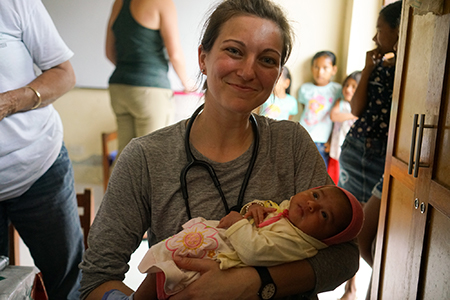
She recalled during her time in Peru an instance when a patient came into the clinic with a large mass that was growing over his right eye. She said that while the team from WMed could not do anything surgically for the man, they were able to debride and re-wrap the growth and then train a local healthcare worker on how to care for the mass. They also tried to connect the man to the resources he needed for additional and future care.
“Limitations and access to care obviously cause certain conditions to progress further than what is typical in the U.S. and it definitely illustrated that it’s not just about knowledge or intention when a patient doesn’t follow a certain direction or guidance,” Ramachandran said. “A lot of times it’s about access and availability and even though we had the best of intentions, there are still limitations to what we could do.
“That was tough but I think that is the reality of medicine sometimes,” Ramachandran added.
Ramachandran and Walbridge both said they are hopeful they will be able to complete a global health elective in the future while in residency training. Additionally, Dr. Baran said she hopes to return to Peru with WMed and Amazon Promise.
“I would absolutely recommend this trip to anyone that wants to experience a new culture, to see unique medical pathology, and to help provide sustainable healthcare to a very deserving, appreciative, and vulnerable population,” Dr. Baran said.
